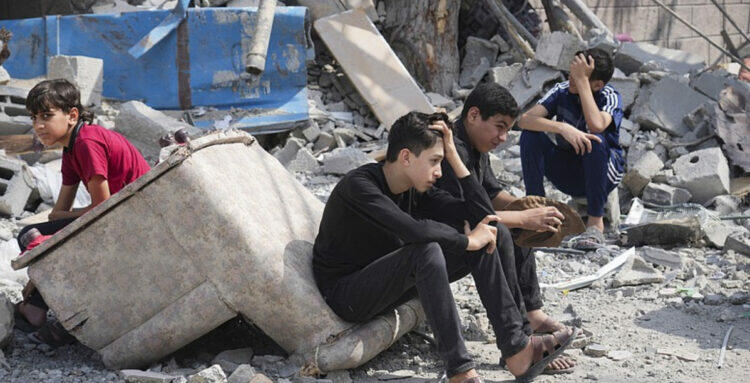Trump’s recent comments about Gaza have sparked international outrage and debate. His suggestion for the U.S. to “own” Gaza and the potential resettlement of Palestinians outside the region have raised significant concerns. Now, the denial of their right to return adds further complexity to the situation.
These moves have sparked questions about the implications for both the Palestinian population and the broader Middle East. Here is a breakdown of Trump’s controversial statements and the reactions they have generated.
Trump wants the US to take control of Gaza
“I’m committed to buying and owning Gaza,” Trump said on Air Force One.
Trump said it would be a “big mistake” to let Palestinians return to the area as thousands have begun to travel back to the rubble left behind since a ceasefire deal was reached with Israel last month.
Palestinians would not have the right to return to Gaza
In an interview with Fox News, Trump said that Palestinians wouldn’t be allowed to return to Gaza. He suggested that the new communities would be built “a little bit away from where they are, where all of this danger is.”
When asked if Palestinians would have the right to go back, Trump replied, “No, they wouldn’t, because they’re going to have much better housing.”
Trump proposes resettling Palestinians outside Gaza
Trump had earlier suggested that Egypt and Jordan could take in Palestinians, but both countries shut down his resettlement idea.
He said he would build up to six new sites for Palestinians to live outside Gaza, effectively creating permanent refugee camps funded by the U.S. president.
Gaza has been destroyed, and it needs rebuilding
Trump has his own wild dreams for Gaza. “We’ll let other countries develop parts of it. It’ll be beautiful. People can come from all over the world and live there,” he told reporters.
Critics accuse Trump of endorsing ethnic cleansing
Trump has said his plan to “take over Gaza” wouldn’t give the 2 million Palestinians living there the right to return. He claims they have “no alternative” but to leave because of all the destruction caused by Israel’s military actions.
The head of the UN’s Independent International Commission of Inquiry on the Occupied Palestinian Territory, Navi Pillay, told Politico that Trump’s plan for the “forcible displacement of an occupied group is an international crime.”
“There is no way under the law that Trump could carry out the threat to dislocate Palestinians from their land,” Pillay said.
Trump views Gaza as a future real estate development
“Think of it as a real estate development for the future,” he said. “It would be a beautiful piece of land.”
Trump continued to endorse a plan for the Palestinians to be resettled in Egypt and Jordan, a plan that both countries have rejected.
The US is committed to rebuilding Gaza
“We’re committed to owning it, taking it, and making sure that Hamas doesn’t move back,” Trump stated.
“We’re going to bring stability to the Middle East, a totally war-torn part of the Middle East,” he added.
There’s been no clear talk about whether Trump’s plan is even doable
His in-flight press conference only raised more questions about how world leaders should handle things in the region moving forward.
So far, there haven’t been any real talks at the Pentagon or State Department about how the U.S. could actually handle what Trump’s proposing, legally or logistically.
Israel supports Trump’s takeover of Gaza
Of course, his announcement was welcomed by Israel’s far-right settler movement, as well as their evangelical allies in the US who have endorsed the annexation of the Gaza Strip and other occupied Palestinian territories, including the West Bank.
Palestinian refugees face a global dilemma
Over 1.5 million Palestinians and their families, who lost their homes in the 1948 Arab-Israeli war, are now living in refugee camps across places like Jordan, Lebanon, Syria, Gaza, and the West Bank, including East Jerusalem.
It’s heartbreaking to think that Trump’s plan could mean the permanent displacement of Palestinians from their homeland, forcing them to live in exile while their homes and heritage are erased.
What do you make of this?

















































